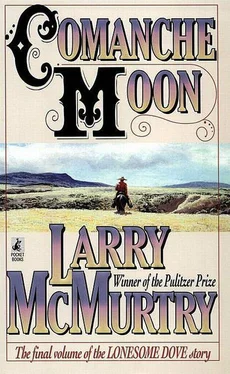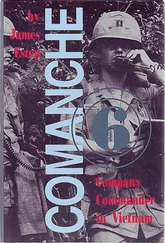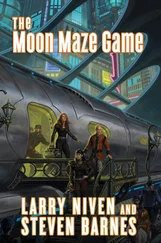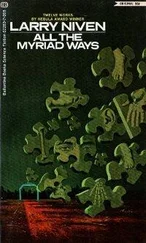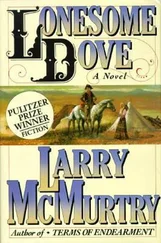It was hard, not easy, but there was no point in trying to make Woodrow understand how hard it was for her.
"It's sunny, at least," Call said.
"Bill hung himself on a mighty pretty day." That didn't sound right either, although it was true: the day was brilliant.
To his dismay, Maggie began to cry all the harder. He didn't know whether it was the standoffish women, or Long Bill's death, or his ill-chosen remarks. He had thought to comfort her, but he didn't know how. He stood awkwardly by the steps, feeling that he would have been wiser just to go along with Gus and see that Bill was wrapped up proper and ready for the coffin.
"Hush, Woodrow, you don't have to talk," Maggie said, grateful that he had come to stand beside her. It was the first time he had done such a thing, when there were people watching.
Just then the rangers came around the corner with the coffin in the wagon. Old Ikey Ripple, who had once pestered Maggie endlessly, drove the wagon. The other rangers rode behind the wagon.
All of them saw Call standing by Maggie at the bottom of the steps.
"I best go--w you be coming?" Call asked.
"Yes, I'll follow along," Maggie said, surprised that he asked.
There was green spring grass in the little graveyard when they buried Long Bill Coleman. Trees were leafing out, green on the distant slopes; fine clear sunlight shone on the mourners; mockingbirds sang on after the hymn singing stopped and the mound of red dirt was shovelled back in the grave. Maggie, fearing censure, hadn't followed very close. Pearl Coleman, bereft, heaved her deep cow sobs throughout the brief service.
"I'm a poor talker, you talk over him," Call whispered to Augustus, when the time had come for someone to speak a few ^ws over the departed.
Augustus McCrae stood so long in thought that Call was afraid he wouldn't find it in him to speak. But Gus, hat in hand, finally looked up at the little crowd.
"It's too pretty a day to be dying, but Long Bill's dead and that's that," he said. "I recall that he liked that scripture about the green pastures--it's spring weather and there'll be green grass growing over him soon." He paused a minute, fumbling with his hat.
When he spoke again he had some trouble controlling his voice.
"Billy, he was a fine pard, let's go home," he said finally.
Pearl Coleman had a brother, Joel, who was stout like her. Joel helped his sobbing sister back down the path toward town. The ladies who liked Pearl and had come to support her in her hour of grief followed the brother and sister away. The other townspeople trickled away in twos and threes but the rangers were reluctant to leave. In the heat of battle they had surrendered many comrades to death, often having no opportunity to bury them or take note of their passing at all. But this death had not occurred in battle; it occurred because Long Bill, a man who had been stouthearted through much violent strife, wanted it.
"I wish we'd had time to caulk the coffin," Ikey Ripple said. "I expect it'll be worms and maggots for Billy, pretty soon." The others cast hard glances at him, causing Ikey to conclude that his views were not appreciated. He decided to seek a saloon, and was joined in his search by Lee Hitch and Stove Jones, men disposed to overlook his views of worms and maggots.
"Reckon Bill would change his mind, if he had a chance to?" Gus asked Call. They were the last to leave, although Pea Eye was not far from them on the path.
Call had been asking himself the same question all day. The last conversation he had had with Long Bill Coleman had been a casual one about the relative merits of mares and geldings, as saddle horses. Long Bill argued for geldings, as being more stable; Call argued for mares, for their alertness. Long Bill talked fondly of a horse he had favored in earlier years, a sorrel gelding named Sugar who had carried him safely on many patrols. Call reminded Bill of a time when Sugar had shied at a badger and run away with him. They had a chuckle, remembering the runaway.
It had been an easy conversation about horses, of the sort he had often had with Long Bill over the years. Sugar grew old and had to be put out to pasture, but Long Bill, from time to time, would have another gelding whose virtues he would brag about, just as Call, from time to time, would acquire an exceptional mare. They would often talk about horses, he and Bill--whatever troubles might be elsewhere in their lives never dampened their interest in the pleasure to be had with good horses.
"He can't change his mind, Gus--x's foolish to even think that way," Call said.
"Gone is gone." "I know it," Gus said--yet he could not stop wondering about Long Bill. In the saloon the night before Long Bill had seemed somber, but not more somber than he had been on many a night.
Augustus couldn't get the business of hanging out of his mind. Hanging wasn't simple, like shooting oneself. Shooting he could imagine. A momentary hopelessness, such as he himself had felt several times since Clara's marriage, could cause a man to grab a pistol and send a bullet into his brain. A few seconds, rushing by so fast they gave one no time for second thoughts, would allow a man to end the matter.
But hanging was different. A rope had to be found, and a stool to climb on. Long Bill had watched the hanging of quite a few thieves and miscreants in his years of rangering; he knew the result was often imperfect, if the knot was set wrong. The hanged man might dangle and kick for several minutes before his air supply was finally cut off. Care had to be taken, when a hanging was contemplated. A good limb had to be chosen, for one thing. Limbs that looked stout to the eye would often sag so far in practice that the hanged man's feet would touch the ground. Long Bill had never been skilled with his hands, thus his quick failure as a carpenter. It taxed him to tie a simple halter knot. The more Gus thought about the physical complications involved in hanging, the more perplexed he felt that his friend had been able to manage his final action successfully.
And why? Had there been a sharp quarrel? Had a nightmare afflicted him so powerfully that he lost his bearings? It seemed that Long Bill was so determined to be free of earthly sorrow that he had gone about the preparations for his death with more competence than he had been capable of when only the chores of life were involved. He had even done it all in the dark, perhaps fearing that if he saw the bright sunrise he might weaken in his resolve and not do it.
"I just wonder what Bill was thinking, there at the end," Gus said.
"You can wonder all you want to," Call said. "We'll never know that. It's just as well not to think about it." "I can't help thinking about it, Woodrow--c you?" Gus asked. "I was the last man to drink with him. I expect I'll think about it for years." They had walked back almost to the steps that led to Maggie's rooms.
"I think about it," Call admitted. "But I ought to stop. He's dead. We buried him." Call felt, thought, that the comment had been inadequate. After all, he too had been friends with Long Bill for many years. He had known several men who had lost limbs in battle; the men all claimed that they still felt things in the place where the limb had been. It was natural enough, then, that with Bill suddenly gone he and Gus would continue to have some of the feelings that went with friendship, even though the friend was gone.
"I can't be thinking about him so much that I can't get the chores done, that's what I meant," Call added.
Augustus looked at him curiously, a look that was sort of aslant.
"Well, that's you, Woodrow--y'll always get the chores done," Augustus said. "I ain't that much of a worker, myself. I can skip a chore now and then, if it's a sunny day." "I don't know what sunny has to do with chores--they need to be done whether it's sunny or not," Call said.
Читать дальше
